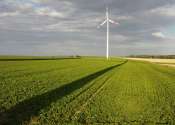A vehicle (Latin: vehiculum) is a mechanical means of conveyance, a carriage or transport. Most often they are manufactured (e.g. bicycles, cars, motorcycles, trains, ships, boats, and aircraft), although some other means of transport which are not made by humans also may be called vehicles; examples include icebergs and floating tree trunks.
Vehicles may be propelled or pulled by animals including humans, for instance, a chariot, a stagecoach, a mule-drawn barge, an ox-cart or rickshaw. However, animals on their own, though used as a means of transport, are not called vehicles, but rather beasts of burden or draft animals. This distinction includes humans carrying another human, for example a child or a disabled person. Means of transport without a vehicle or animal would include walking, running, crawling, or swimming.
Vehicles that do not travel on land often are called craft, such as watercraft, sailcraft, aircraft, hovercraft, and spacecraft
Land vehicles are classified broadly by what is used to apply steering and drive forces against the ground: wheeled, tracked, railed, or skied.









